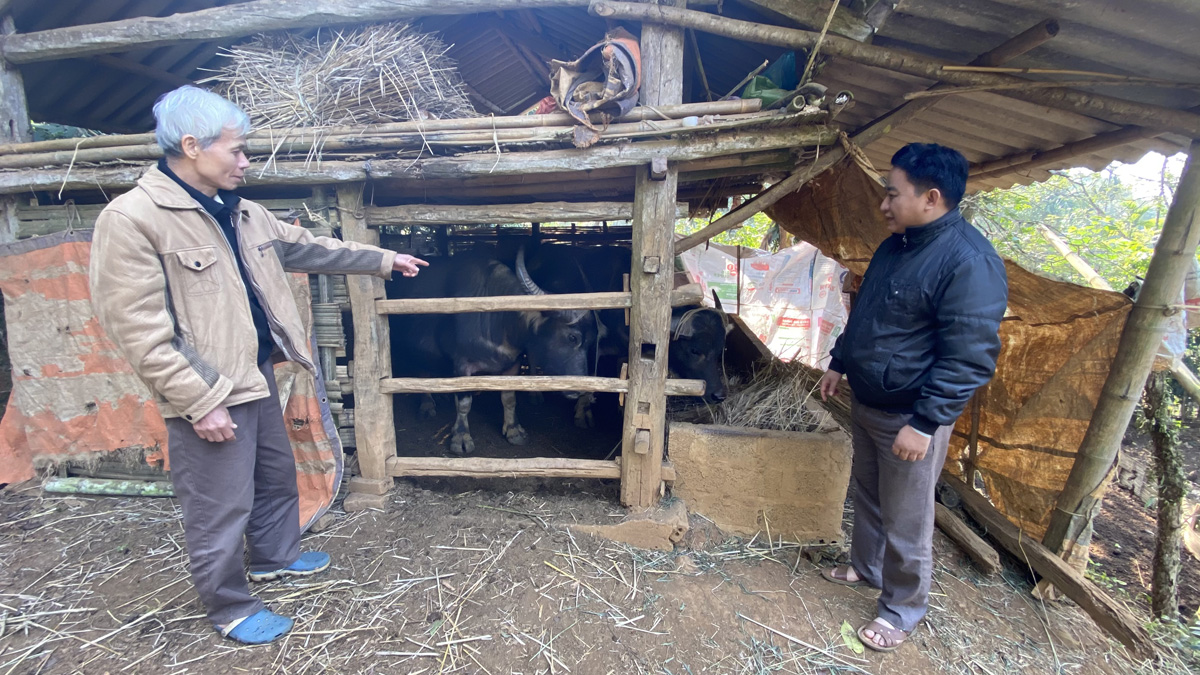
(HBO) - Lac Son district has get a facelift in both material and spiritual lives of local people. Its essential infrastructure such as electricity, roads, schools, and stations has been upgraded, meeting local demand. Effective economic models have helped increase incomes and the living standards of local residents.
 People in Mien Doi commune (Lac Son) pay attention to
developing cattle husbandry models.
People in Mien Doi commune (Lac Son) pay attention to
developing cattle husbandry models.
Nowadays a concrete road runs through Mien Doi commune, with
many new, spacious houses built along it. Small shops are crowded with
customers. According to statistics, the total area of crops reaches 637.75
hectares. The total number of cattle and poultries increases to nearly 38,000
heads, and there are 1,000 bee hives in the commune. The commune has 31
households involved in industrial, handicraft and trade and service. Per capita
income reaches 29 million VND per person per year, and the poverty rate reduces
to 46 percent.
The district People’s Committee has directed relevant units
to review the lists of supporting measures for production development in
accordance with each locality’s conditions. Accordingly, in 2020, the district supplied
agricultural materials for 18 communes worth a total 5.3 billion VND, including
4,474 cattle and poultry heads, 92 mowers, 115 pumps, and 12 ploughing machines.
It also coordinated with sectors and organisations to hold 23 training classes
to raise capacity of the community and grassroots officials.
The district People’s Committee has also paid attention to
upgrading transport linkages between the mountainous communes of Mien Doi, Ngoc
Son, Ngoc Lau and Tu Do to facilitate the development of community-based
tourism, while taking measures to promote and maintain traditional identity./.
Hoa Binh province is undergoing a dynamic transformation amid Vietnam’s national digital transition. Building on Poliburo’s Resolution No. 57-NQ/TW on breakthroughs in science, technology, innovation, and national digital transformation, the province has rolled out a wide range of practical action plans. A standout initiative is the "Digital Literacy for All” movement, an effort to ensure that no one is left behind in the digital era.
Hoa Binh province is undergoing a dynamic transformation in the wake of the national digital transformation movement. Building on Resolution No. 57-NQ/TW of the Politburo on breakthroughs in science, technology, innovation, and national digital transformation, the province has implemented a wide range of practical action plans. A standout initiative is the "Digital Literacy for All” movement ambitious effort to ensure that no one is left behind in the digital age.
With a spirit of unity and proactive problem-solving, the Party Committee, the government and the people of Dong Lai Commune (Tan Lac District) have made great strides in implementing the resolutions of the 24th Party Congress of the commune for the 2020 - 2025 term. Focusing on leadership and practical actions, the commune has brought the Party’s resolutions into daily life, creating strong impacts and pushing the local development forward.
Amid the nationwide push for digital transformation, young people in Hoa Binh Province are stepping up as dynamic pioneers, applying technology to enhance Youth Union operations and expand the reach of youth-led initiatives. Through creativity and adaptability, Youth Union organizations at all levels have introduced a series of practical solutions, contributing to modern governance and community development.
In recent years, An Nghia commune, located in Lac Son district, has stepped up administrative reform, focusing on improving the quality and efficiency of its single-window service unit for receiving and processing administrative procedures. These improvements have helped create favourable conditions for local residents and organisations to handle administrative procedures, contributing to the commune’s broader socio-economic development.
The Prime Minister-approved master plan to develop the multi-use value of forests ecosystems through 2030, with a vision to 2050, aims to improve the management and sustainable use of forest resources, create jobs, increase incomes, and improve the living standards of ethnic minorities, people in mountainous and remote areas, forest workers and those living near forests.



 People in Mien Doi commune (Lac Son) pay attention to
developing cattle husbandry models.
People in Mien Doi commune (Lac Son) pay attention to
developing cattle husbandry models.